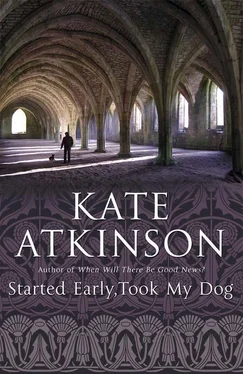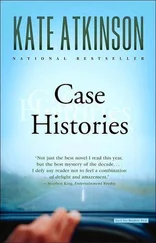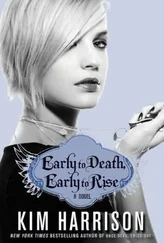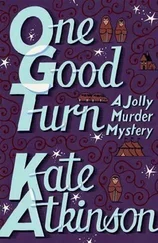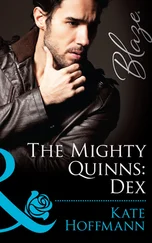He sometimes wondered, if the Atwells had been in possession of stronger hearts, would they have kept him? Would he have become a farm boy, would he even now be driving a tractor up on the hills with a sheepdog riding shotgun? (For want of a nail.)
For a while, after his annus horribilis (the Queen had helpfully taught him the phrase), Jackson had fantasized that he had another family somewhere, Irish diaspora that his mother had carelessly omitted to mention. He imagined her coming back from the dead to tell him about them ( Ah, for sure, the McGurks in Pontefract, they’ll look after you, Jackson ). Perfectly ordinary people, the kind he saw on television and read about in comics and (occasionally) in books – cousins who worked in offices and shops, drove taxis, delivered babies. Uncles who hung their own wallpaper and kept allotments, aunts who baked cakes and knew the value of love and money – they all existed somewhere, inhabitants of his personal soap opera, waiting for him to find them and be crushed to their collective, comforting bosom. But these people never manifested themselves and for the next three years Jackson inhabited an emotional void, just himself and his father locked together in mute disregard.
When he was sixteen Jackson joined the army. He embraced his new austere existence with the zeal of a warrior monk discovering the profit of discipline. He was broken down and then built up again, his one and only allegiance to his new, brutal family. The army was tough but it was nothing compared to the life before. Jackson was just relieved to have a future at last. Any future.
If his mother had gone to a doctor sooner with her cancer instead of suffering the archetypal ancient martyrdom of the Irish mother, then perhaps she would have hit his brother about the head with a rolled-up newspaper (a common form of communication in their family) and told him to get off his backside (he was nursing a foul hangover) and get out into the rain and meet his sister off the bus. Then Niamh wouldn’t have been attacked by her unknown assailant who raped her and strangled her and then threw her body into the canal. For want of a nail.
After his visit to Jervaulx, Jackson had gone on a pilgrimage to find Howdale again. Working on instinct, with a little help and some hindrance from SatNav Jane, he made his way down back roads until he came to a sign that announced Howdale Farm Holiday Homes . He turned down the drive, once a muddy track but now weed-free and fresh with tarmac, and saw the farmhouse still sitting squarely at the end. The adjacent dairy and a scattering of farm workers’ cottages that he had forgotten about were now all done up in matching white-and-green-painted livery. No sign of cows or sheep, no smell of manure and silage, none of the usual rusting litter of old farm machinery. The place had been transformed into a sanitized, storybook kind of farm. Once upon a time Jackson had erased his past, now his past had erased him.
Jackson climbed out of the car and looked around. There was a small children’s play area where Joan Atwell had hung her washing, a large gravelled turning circle where a run-down old barn had once stood. A group of people of all ages (they called that a family, Jackson reminded himself) was hanging out, drinks in hand, on a lawn that had once been the farmyard. He caught the primitive smell of searing meat. At the sight of Jackson, the adults in the group looked uneasy and one of the men raised his voice, ready for belligerence, a pair of barbecue tongs clutched in his hand like a weapon, and said, ‘Can I help you?’
Jackson had no taste for hostility in these surroundings and so he shrugged and said, ‘No,’ a response which seemed to unsettle the group further.
He climbed back in the Saab and caught a glimpse of himself in the rear-view mirror. Someone slightly feral looked back. He hadn’t shaved for several days and his hair flopped dirtily in his eyes. There was a lean and hungry look about him that he didn’t recognize. At least he still had his own hair. Every guy you saw these days had shaved away his male-pattern baldness in a futile attempt to look hard rather than merely hairless. Jackson had recently turned fifty, a fact he still hadn’t entirely come to terms with. The golden years . (Yeah, right.) ‘A milestone,’ Josie laughed as if it were a huge joke. He had avoided the birthday altogether, spending the weekend miserably on his own in Prague, side-stepping drunken English stag and hen parties. On his return he had set off on this journey.
His definition of elderly had changed as he himself had moved nearer to the event horizon of death. When he was twenty, old people were forty. Now he was over the hill of his half-century the definition began to stretch towards something more yielding, but nonetheless once you hit fifty there was no escaping the fact that you had a one-way ticket on a non-stop service to the terminus.
He drove off, aware that the barbecuing family were watching him all the way down the drive. He understood, he would have been wary of himself as well.
In Knaresborough Jackson had sought out Old Mother Shipton’s Cave, a destination that had once been a stopover on that school trip to Fountains. The schoolboy Jackson had gazed in surprise at the petrified items in Old Mother Shipton’s Cave – umbrella, boots, teddy bears – hanging beneath the well. The alchemy of the Dropping Well was due simply to the high mineral content of the water and yet even now the adult Jackson still found something strangely affecting in its preservation of mundane objects. His younger self had thought that ‘petrified’ meant ‘terrified’ and had wondered if he were to become too frightened by something, or someone, would he end up like those inert, everyday objects? It didn’t work like that, he knew now. It wasn’t being frightened that turned you into stone, it was being the one who did the frightening.
After Jackson had almost died in the train crash he was grateful to have survived but there was a part of him that had feared that being saved would turn him soft and he would become one of those grateful evangelists of positive living ( Every day is a gift, I’m going to make my time on earth count , et cetera). However, somewhat to his surprise, the new version of Jackson that emerged from this harrowing was a colder and harder one than he had expected. ‘The leaner, meaner Jackson,’ Julia laughed. ‘Ooh, I’m scared.’ Perhaps she should be.
He would never be free of her now that they were united through their son. Two become one. As the Spice Girls might say.
*
He had met Julia at Rievaulx. He tended to meet her on neutral territory these days. There had been an unfortunate incident a couple of years ago when a tired and emotional Jackson had turned up on the doorstep of the Dales cottage she was sharing with her arty, überbourgeois husband, Jonathan Carr, and bluntly ‘explained’ to him that Nathan was not, as Jonathan thought, his child. And he had the evidence to prove it, Jackson said, triumphantly waving the results of a DNA test in his face.
There was, naturally, some violence but it hardly mattered. Jackson had threatened a custody suit but he was aware that he was blustering and Julia knew it too. (Jonathan Carr’s opinion didn’t count, not to Jackson anyway.) Jackson didn’t want to bring up another child, with or without Julia, he just wanted to establish the fundamental principle of ownership.
Now there was an unstated delicacy in their triangular relationship. The man who fathered the boy, the man who was raising him and the treacherous woman at the apex. My Son Calls Another Man Daddy . Trust Hank to tell it how it is.
He had met Julia and Nathan not at Rievaulx itself but on the Terraces above, from where there was a panoramic vista of breathtaking beauty. It brought out the Romantic soul in Jackson, once hidden in a dark, deep mineshaft but lately peeking its head, unabashedly, into the daylight. He might have become a harder version of himself on the outside but on the inside the spirit could still soar. Rievaulx, Beethoven’s Fifth, a mother and child reunion.
Читать дальше
